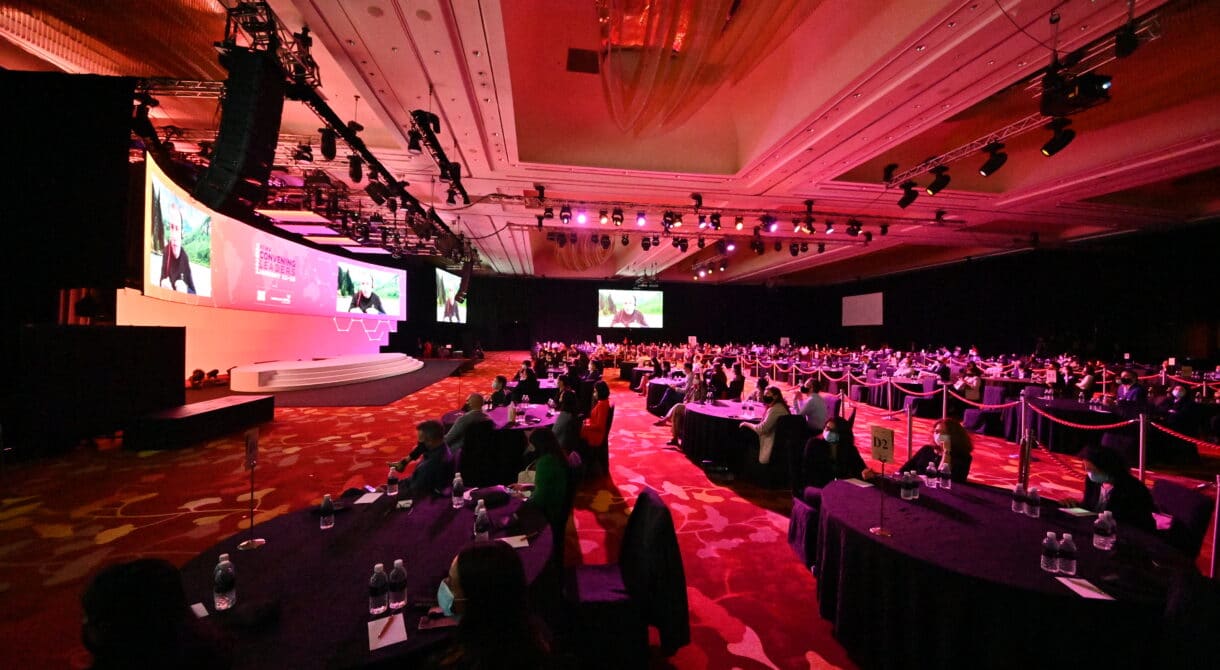The meetings industry has always been a key driver of Singapore’s growth, and there is a strong industry interest in and demand for business events. As it cannot survive on just its domestic market, there is an urgency for the city-state to host international meetings of any type and format. As Asia’s Greenest City, Singapore may also be one of the most densely populated countries on the globe—with 5.6 million people calling the tiny, 724-square-kilometer island home—and it’s proving to be a major player in the reset of business events, in the safest environment possible.
End-to-end service
To do so, a whole protocol has been put in place, referred to as an “end-to-end service,” as Trade and Industry Minister Chan Chun Sing put it in a recent interview with The Straits Times. Events with up to 250 attendees are possible and intended to open the doors to holding others on an even larger scale. Organizers wishing to plan an event in Singapore must demonstrate the ability to implement safe management measures, which include limiting overall density of attendees and having infection control measures before and after the event.
In this context, TravelRevive was, last October, the first international travel tradeshow to take place physically in Asia Pacific during COVID-19, with both local and foreign attendees and exhibitors. The event attracted close to 1,000 attendees onsite, of which about 65 were foreign delegates from 14 countries in Asia, Middle East and Europe. In this context, Singapore Tourism Board (STB) is committed to supporting the transformation of the meetings industry, as it pivots and adapt to new event formats and business models to stay relevant.
“For trade shows, face-to-face engagement and negotiations are important to build networks and to create business opportunities. But these can be hard to achieve via virtual platforms,” explains Dr Edward Koh, Executive Director, Conventions, Meetings & Incentive Travel, STB. “Nonetheless, hybrid elements in physical events can still offer opportunities for event organizers. For example, a hybrid format will likely allow them to secure more prestigious keynote speakers who would normally not attend physically. Virtual platforms are also able to reach an extensive global audience, unlocking new market potential, e.g. virtual audiences who are unable to attend in person. This is exactly what we tried to achieve by hosting, at and with Marina Bay Sands, the Global Broadcast Center of PCMA Convening Leaders.”
Quite successful
To this extent, PCMA Convening Leaders was quite successful. Though the networking was quite a challenge to be honest, with delegates not being able to network outside of their designated zone, the organization was flawless and the content of high-quality.
This article was written by Boardroom Chief Editor Remi Deve. The right to use it, in parts or in full, has to be granted by the Publisher. More information on Singapore: www.visitsingapore.com/mice / Melissa_Jane_THOMPSON@stb.gov.sg
While PCMA CEO Sherrif Karamat, who joined the main stage as a hologram, reminded the audience that associations are in a unique place to drive recovery with them being “the main providers of life-long learning,” STB CEO Keith Tan argued that “this pandemic has taught us how to be ready for the future, as we continue to experiment, create alternative models that hopefully will allow us to face any challenges, contingencies and scenarios the upcoming months and years might bring us.”
Shirlena Soh, President of the Singapore-based Association of Biomedical Professionals, who was present during a panel on the relevance of associations, doesn’t think otherwise. She said: “As an association, all we’re interested in is bridging the gap between research and application, knowledge transfer and the sharing of best practice as well as challenges. As most associations need guidance in Asia, I believe an event like PCMA Convening Leaders in Singapore can only but show them the way forward.”
In that sense, Singapore Tourism Board and Marina Bay Sands surely made quite an impact. And this was precisely what the original intention was. As Paul Town, Senior Vice President, Resort Operations, Marina Bay Sands, put it, “we’re here to help make sure organizations are impactful. We want to be inspiring and provide the best technology, like that our state-of-the-art broadcast studio, so that associations can fulfill their mission and vision.”
“Beyond the tangible economic benefits, we see meetings as central to our position as a global business hub and key node within Asia. Business events facilitate the exchange of knowledge, ideas and capital, allows us to attract more investment opportunities, and builds leadership in Singapore’s key industry clusters,” Dr Edward Koh concludes. “We remain confident in the long-term prospects of Singapore’s tourism and MICE sectors. The fundamentals that make Singapore a key meetings hub and attractive location for business and leisure events remain unchanged, and our industry is resilient. This puts us in a good position to emerge stronger from COVID-19.”
